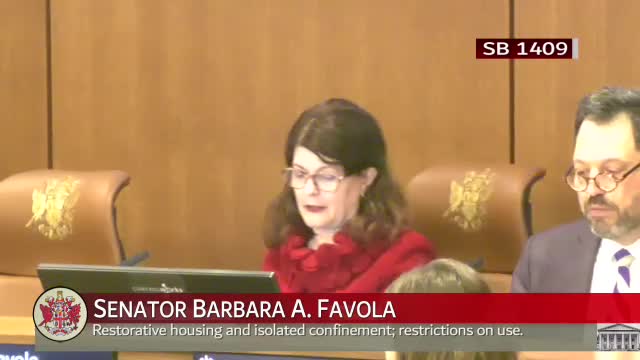Committee advances bill to limit prolonged solitary confinement after extensive testimony; DOC opposes
Get AI-powered insights, summaries, and transcripts
Subscribe
Summary
SB 1409, a measure to set guardrails on prolonged solitary confinement and require reporting on lockdowns, was reported and re‑referred to the Finance Committee by an 8–7 vote after supporters — including survivors and faith and advocacy groups — testified in favor and Department of Corrections officials objected.
The Senate Rehabilitation and Social Services Committee voted 8–7 to report SB 1409 and refer it to the Finance Committee. The bill would place time limits on prolonged solitary confinement, expand oversight and require the Department of Corrections to track and publicize use of restrictive housing.
Senator Bagby, the bill’s patron, said the proposal “puts guardrails and disclosures on the use of prolonged solitary confinement in Virginia prisons” and would define time limits, increase oversight and require reporting on lockdowns.
Multiple survivors and advocacy groups gave in‑person and virtual testimony in support. Jeff Caruso with the Virginia Catholic Conference said the group supports the legislation; David Smith, director of Social Action Linking Together (SALT) and a self‑described solitary survivor, called for guardrails. Several other witnesses — including formerly incarcerated people, family members, and representatives of Interfaith Action for Human Rights and the Virginia Justice Alliance — described long‑term harms from extended isolation and urged passage.
The Department of Corrections submitted formal opposition. Marcus Seelom, corrections operations administrator, told the committee: “We strongly oppose this bill as it requirements that this bill would have a significant impact on the safety and security of our facilities and our inmates as well as staff.” He argued that a fixed 15‑day cap does not account for ongoing risk or pending criminal charges and said the bill’s review and appeal timeframes would increase staff workload and could endanger staff and inmates if dangerous individuals were returned to general population before risks abated.
Committee debate reflected that split: advocates emphasized human‑rights and rehabilitation concerns; DOC stressed safety and operational impacts. On the committee roll call the bill passed narrowly and now moves to Finance for fiscal analysis and consideration of implementation consequences.
Ending: SB 1409’s Finance referral means detailed fiscal and operational review is next; lawmakers and stakeholders can expect additional hearings and possible amendments on operational exceptions and reporting requirements.
